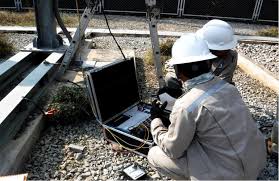NDT Inspection Compliance in Petrochemical Sector in Egypt
NDT inspection compliance is a crucial aspect of ensuring the safety and integrity of equipment and facilities in the petrochemical sector. In Egypt, the adherence to NDT inspection standards plays a vital role in maintaining the reliability and efficiency of operations within this industry. This article will explore the NDT inspection compliance in the petrochemical sector in Egypt, focusing on the importance of regulatory adherence, the challenges faced, and the potential solutions to ensure the highest level of safety and quality.
NDT inspection compliance in the petrochemical sector in Egypt plays a critical role in ensuring the safety and integrity of infrastructure and equipment used in the industry. This includes the inspection of pressure vessels, piping, storage tanks, and other components to detect and prevent potential defects or failures that could lead to accidents or environmental hazards. The Egyptian government has put in place regulatory standards and requirements for NDT inspections to be carried out by certified personnel and approved testing methods. Compliance with these regulations is essential for ensuring the reliability and operational efficiency of petrochemical facilities in Egypt. Additionally, adherence to NDT inspection compliance helps to maintain the reputation and credibility of the petrochemical sector, both domestically and internationally.
Overview of NDT Inspection Compliance in the Petrochemical Industry in Egypt

The petrochemical industry in Egypt relies heavily on non-destructive testing (NDT) inspection to ensure the safety, integrity, and compliance of its infrastructure and equipment. NDT inspection techniques are used to assess the quality and performance of critical components such as pipelines, storage tanks, pressure vessels, and other processing equipment. In order to maintain high standards of safety and compliance, the petrochemical industry in Egypt is subject to stringent regulations and standards for NDT inspection. These regulations are set by government authorities and industry organizations to ensure that NDT processes are carried out by qualified personnel using approved techniques and equipment. NDT inspection compliance in the petrochemical industry in Egypt also involves the documentation and reporting of inspection results, as well as the implementation of corrective actions to address any identified issues. This helps to ensure that the integrity of petrochemical facilities is maintained and that potential risks are minimized. Overall, NDT inspection compliance plays a vital role in ensuring the safety, reliability, and regulatory compliance of the petrochemical industry in Egypt. It helps to mitigate the risk of accidents, environmental incidents, and regulatory violations, thereby safeguarding the industry's operations and reputation.
Challenges and Best Practices for NDT Inspection Compliance in Egypt

Challenges for NDT inspection compliance in Egypt include inconsistent regulatory enforcement, lack of standardization and certification for NDT technicians, and limited access to advanced NDT technologies. Best practices for overcoming these challenges involve implementing a robust quality management system, providing comprehensive training and certification programs for NDT technicians, and investing in state-of-the-art NDT equipment and techniques. Collaboration with international NDT organizations and adopting best practices from leading countries can also help improve NDT inspection compliance in Egypt.
The Importance of NDT Inspection Compliance for Petrochemical Facilities in Egypt

NDT inspection compliance is crucial for petrochemical facilities in Egypt as it ensures the safety and reliability of their equipment and operations. Non-Destructive Testing (NDT) is used to examine materials and components for defects without causing damage, making it a vital part of maintaining the integrity of facilities in the petrochemical industry. Compliance with NDT inspection standards helps in identifying potential issues before they lead to accidents or production downtime, ultimately saving costs and preventing harm to personnel and the environment. Additionally, meeting NDT inspection compliance requirements is often a regulatory obligation for petrochemical facilities in Egypt, and non-compliance can result in severe consequences such as fines, shutdowns, or litigation. Overall, NDT inspection compliance plays a crucial role in upholding the safety, efficiency, and reputation of petrochemical facilities in Egypt.
Regulatory Framework for NDT Inspection Compliance in the Egyptian Petrochemical Sector
The regulatory framework for NDT inspection compliance in the Egyptian petrochemical sector is primarily governed by the Egyptian Organization for Standardization and Quality (EOS) and the Ministry of Petroleum. These regulatory bodies enforce standards and guidelines for non-destructive testing (NDT) to ensure the integrity and safety of equipment and facilities in the sector. The regulations cover various aspects of NDT such as personnel certification, equipment calibration, inspection procedures, and record-keeping requirements. Companies operating in the petrochemical sector are required to adhere to these regulations and undergo regular inspections to verify compliance. In addition to the national regulations, international standards such as those set by the American Society for Nondestructive Testing (ASNT) and the International Organization for Standardization (ISO) may also be applicable depending on the specific industry and contractual requirements. Non-compliance with NDT regulations can result in significant penalties, suspension of operations, or even legal actions. Therefore, companies operating in the Egyptian petrochemical sector are expected to prioritize regulatory compliance and invest in appropriate NDT infrastructure and personnel training to ensure the safety and reliability of their facilities.
Case Studies: Achieving NDT Inspection Compliance in Egypt's Petrochemical Plants
The case study focuses on achieving NDT inspection compliance in Egypt's petrochemical plants. It delves into the challenges faced by the industry, the solutions implemented to meet regulatory requirements, and the outcomes of those efforts. The study provides valuable insights into the steps taken to ensure that non-destructive testing (NDT) inspections are conducted in accordance with international standards, ultimately improving safety and operational efficiency in the petrochemical sector in Egypt.
Training and Certification Requirements for NDT Inspection Compliance in Egypt
In Egypt, NDT inspection compliance requires individuals to undergo training and obtain certification in non-destructive testing (NDT) methods. This typically includes completion of a recognized NDT training program, as well as passing written and practical examinations to demonstrate proficiency in specific NDT techniques. The Egyptian Society for Non-Destructive Testing (EGSNT) is the governing body responsible for setting the standards and requirements for NDT certification in the country. The EGSNT also provides training and certification opportunities for NDT professionals. Additionally, individuals seeking NDT certification may need to fulfill certain work experience requirements and adhere to ongoing professional development to maintain their certification status.
Future Trends and Innovations in NDT Inspection Compliance for the Petrochemical Industry in Egypt
One future trend in NDT inspection compliance for the petrochemical industry in Egypt is the incorporation of advanced digital technologies, such as robotics and drones, for inspection and monitoring of critical equipment and infrastructure. These technologies can provide more accurate and efficient inspections, as well as enable remote monitoring and data analysis. Another innovation is the development of automated inspection systems that utilize artificial intelligence and machine learning algorithms to analyze inspection data in real time, identify potential defects or anomalies, and predict equipment failure. This can help improve safety and reliability while reducing downtime and maintenance costs. Additionally, there is a growing emphasis on the use of non-destructive testing (NDT) methods that are more environmentally friendly and sustainable, such as ultrasonic and electromagnetic techniques that reduce the use of chemicals and hazardous materials. This aligns with the increasing focus on sustainability and environmental responsibility within the petrochemical industry. Overall, the future of NDT inspection compliance for the petrochemical industry in Egypt will likely be characterized by the integration of advanced digital technologies, automation, and sustainable practices to improve efficiency, safety, and reliability in inspections and maintenance.
.jpg)